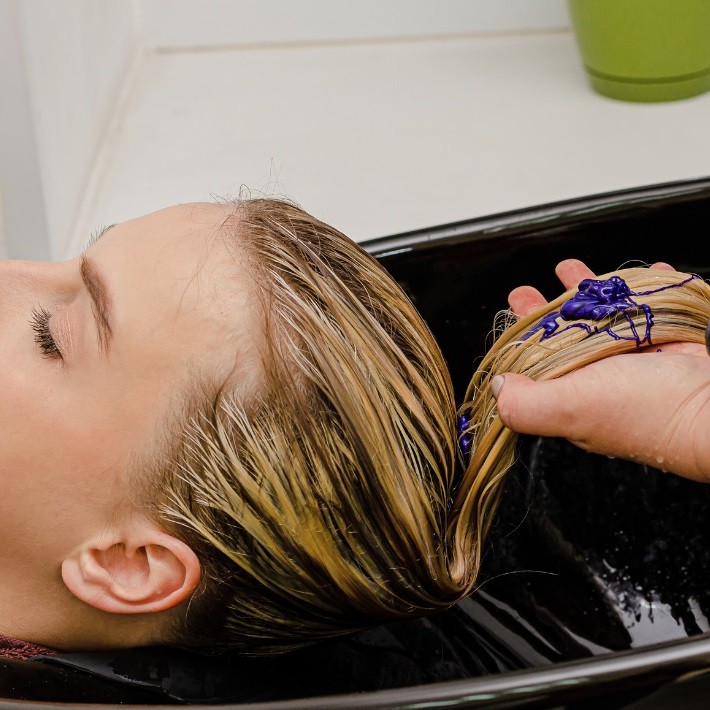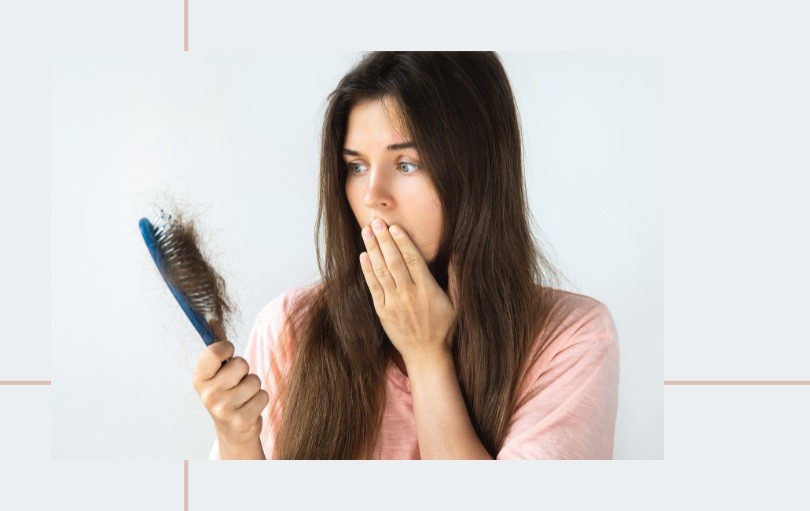Last Updated on March 28, 2025
The purple shampoo itself does not cause hair loss. Some ingredients in certain purple shampoos may lead to hair loss if used excessively or if an individual is allergic to the ingredients.
The purple shampoo has become a go-to product for those with blonde, silver, or gray hair to help eliminate brassiness and maintain the desired color tone. While this product is safe to use, some individuals may experience hair loss due to the ingredients in a particular purple shampoo. The ingredients that can cause hair loss are sulfates, parabens, and synthetic fragrances. These ingredients are harmful to the hair if used excessively or if an individual is allergic to any of the ingredients. It’s important to choose a purple shampoo that is free of these harmful ingredients to maintain healthy hair growth.
Understanding Purple Shampoo And Hair Loss

Can purple shampoo be a significant cause of hair loss? This is a question that has been bothering many people who use this product. The last thing you want is to use a product that ends up damaging your hair in the long run.
To understand if purple shampoo can cause hair loss, you need to first understand how it works.
Related: What Does Purple Shampoo Do To Black Hair?
Explanation Of How Purple Shampoo Works
Purple shampoo is often recommended for individuals with blonde, silver or white hair, as it helps to neutralize the yellow and brassy tones that can sometimes be present.
- Purple shampoo contains purple pigment, and when applied to the hair, it works by neutralizing the warm, yellow tones on blonde and silver hair.
- As a result, the hair appears brighter with a more vibrant and natural-looking color.
- Purple shampoo is used mainly as a toning solution, which means that it does not lighten or darken your hair.
Discussion Of The Causes Of Hair Loss
Hair loss is a common problem that affects both men and women across different age groups.
- Genetics: hair loss can be hereditary, and if it runs in your family, you are likely to experience it at some point in your life.
- Hormonal changes: hormonal changes during pregnancy, menopause, or thyroid problems can result in hair loss.
- Stress: high levels of stress can cause hair loss in both men and women.
- Nutritional deficiencies: lack of essential vitamins and minerals like zinc, iron, and vitamin b12 can cause hair loss.
Do Purple Shampoo And Hair Loss Have Any Correlation?
There is no scientific evidence to prove that purple shampoo is harmful to your hair or causes hair loss. Experts believe that consistent use of purple shampoo can lead to hair breakage, especially if the shampoo is applied excessively or left on the hair for too long.
While there is no known direct correlation between purple shampoo and hair loss, it is always recommended that you use products in moderation. If you start to experience any unusual hair loss, seek the advice of a medical professional. Opting for natural hair care products or consulting a professional stylist can also help protect your hair from loss and other related problems.
Common Misconceptions About Purple Shampoo And Hair Loss
Can Purple Shampoo Cause Hair Loss?
If you have blonde or silver-toned hair, you likely use purple shampoo to maintain your color’s vibrancy. Some people may have concerns about using purple shampoo, which is the reason for this blog post. One of the main worries is whether purple shampoo can cause hair loss.
In this section, we’ll debunk the myths surrounding purple shampoo and hair loss and provide scientific evidence to support that purple shampoo does not cause hair loss.
Debunking The Myths About Purple Shampoo Causing Hair Loss
There are a few reasons why people may believe that purple shampoo can cause hair loss.
- Purple shampoo is too harsh and causes hair to become brittle and break.
- Purple shampoo damages the scalp, leading to hair loss.
- Purple shampoo strips the oils from the hair and scalp, causing hair to become dry, and eventually leading to hair loss.
These beliefs are not accurate.
- Purple shampoo is formulated with gentle ingredients that are safe for color-treated hair and the scalp. These ingredients do not cause hair to become brittle and break.
- Purple shampoo’s special formula is designed to help maintain hair color while keeping hair and scalp nourished and healthy. It does not damage the scalp, leading to hair loss.
- Purple shampoo does not strip hair of its natural oils, which can cause dryness and eventually hair loss. Instead, it contains nourishing ingredients such as argan oil, keratin, and vitamins to help maintain moisture levels in the hair.
Related: How To Remove Purple Shampoo Stain From Hair?
Addressing The Reasons Why People May Believe Purple Shampoo Causes Hair Loss
Some people believe that purple shampoo causes hair loss because of common misconceptions or a lack of information.
- Incorrect information or rumors spread on social media and other online forums.
- Lack of knowledge about how purple shampoo works and its ingredients.
- Confusion between different types of shampoo and their effects on the hair and scalp.
To address these concerns, it’s important to understand how purple shampoo works.
Purple shampoo works by neutralizing brassy tones caused by oxidation on blonde or silver-toned hair. It contains a small amount of purple pigments, which cancel out yellow tones, making hair brighter and less brassy.
Furthermore, purple shampoo’s ingredients are safe and gentle. It does not contain harsh chemicals that lead to hair loss.
Scientific Evidence To Support That Purple Shampoo Does Not Cause Hair Loss
Several studies have found that purple shampoo does not cause hair loss. In fact, using purple shampoo can be beneficial for maintaining healthy hair, especially for color-treated hair.
One study published in the international journal of Trichology found that shampoos containing argan oil and keratin can improve the strength of hair when used regularly and can help prevent hair breakage.
There is no scientific evidence to support that purple shampoo causes hair loss. The common misconceptions are false, and purple shampoo is a safe and effective way to maintain vibrant, healthy, and beautiful blonde or silver-toned hair. Remember, always use the recommended amount of purple shampoo and massage it gently into the scalp and hair for the best results.
Best Hair Care Practices When Using Purple Shampoo

Can Purple Shampoo Cause Hair Loss?
If you’ve been using purple shampoo for any length of time, you may have heard rumors that it can cause hair loss. But is there any truth to this claim? While regular washing and styling habits can contribute to hair damage and loss, purple shampoo alone is not a culprit.
In fact, when used appropriately, it can make your hair look healthier than ever.
Dos And Don’Ts Of Using Purple Shampoo
Dos:
- Use a quality, sulfate-free purple shampoo designed for your hair type.
- Use purple shampoo once a week or as recommended by your stylist.
- Leave the shampoo on for no more than five minutes before rinsing thoroughly.
- Follow up with a nourishing conditioner or hair mask.
- Maintain a consistent hair-care routine that includes regular trims and minimal heat styling.
Don’ts:
- Use purple shampoo on a daily basis.
- Overuse purple shampoo, as it can lead to over-toning and dryness.
- Leave the shampoo on for too long, as it can leave a purple stain on your hair.
- Use purple shampoo as a replacement for traditional shampoo.
- Ignore signs of dryness or damage in your hair.
How Frequently Should You Use Purple Shampoo
Using purple shampoo too often can leave your hair looking dull and dry. Failing to use it often enough can also lead to uneven, brassy tones. As a rule of thumb, it’s recommended that you use purple shampoo once a week.
If your hair is particularly prone to brassiness, you may want to use it twice a week. Always consult with a stylist to determine what frequency of use works best for your hair type.
Healthy Hair Habits: Beyond Shampoo
Caring for your hair goes beyond choosing the right shampoo. It’s about cultivating healthy hair habits.
Nutrition: Feeding Your Hair Right
Just like your body, your hair needs nutrients to stay healthy. Foods rich in protein, biotin, and antioxidants can give your hair the nourishment it needs from within.
Heat Styling: Proceed with Caution
Heat styling tools can wreak havoc on your hair, causing breakage and dryness. If you must use them, always protect your hair with a heat-protectant spray.
Tips For Maintaining Healthy Hair
While purple shampoo can help to keep your hair looking vibrant and healthy, there are other things you can do to ensure that your locks stay hydrated, strong, and voluminous:
- Avoid excessive heat styling, as the hot tool can damage your hair cuticle and lead to breakage or split ends.
- Keep your hair hydrated by drinking plenty of water and using a nourishing conditioner.
- Try to minimize your use of hair products that contain harsh chemicals, including bleach and peroxide.
- Use a silk pillowcase to prevent both tangles and hair breakage.
- Get regular trims to remove damaged ends and avoid stress on your hair.
Alternative Hair Care Options For Those With Hair Loss Concerns
If you’re concerned about hair loss or thinning, there are alternative hair care options that you can try.
- Aloe vera: applying the gel directly to your scalp can soothe and moisturize your hair follicles.
- Pumpkin seed oil: this oil is rich in vitamins and minerals that can help to promote hair growth.
- Rosemary oil: regular application of this oil can help to stimulate hair growth, according to some studies.
- Collagen: this protein can help to strengthen your hair from the inside out.
- Biotin supplements: these supplements are believed to promote hair growth and thickness.
Proper use of purple shampoo can help to keep your hair vibrant and healthy without causing any damage or loss. By following these hair care practices and consulting with a stylist, you can maintain the perfect shade of blonde or silver while keeping your hair strong and voluminous.
Purple Shampoo Alternatives: Other Ways to Banish Brassiness
If you’re worried about the effects of purple shampoo, there are alternatives to keep your blonde or silver hair vibrant.
Purple Conditioner: A Milder Option
Purple conditioner offers the same brass-busting benefits as purple shampoo but in a milder form. This could be a great alternative if you have particularly dry or brittle hair.
Hair Toner: An Occasional Boost
Hair toners can neutralize unwanted brassy tones in your hair. However, they’re best used sparingly and professionally, as overuse can lead to hair damage.
Related: Rose Water Uses and Benefits for Hair?
Frequently Asked Questions For Can Purple Shampoo Cause Hair Loss?
1. What’s the difference between hair loss and hair breakage?
Hair loss is when hair falls out from the root, often with a tiny white bulb at the end. Hair breakage is when hair snaps mid-strand, usually without the white bulb.
2. Can Use Purple Shampoo Cause Hair Loss?
The purple shampoo will not cause hair loss if used correctly and in moderation. Overuse of any product, including purple shampoo, may lead to scalp irritation, inflammation, and hair loss.
3. How Often Can I Use Purple Shampoo On My Hair?
You should use purple shampoo as recommended on the product label or by your stylist. Generally, it is not recommended to use it more than once a week, or it may over-dry your hair and scalp.
4. Is It Essential To Use A Conditioner After Using Purple Shampoo?
Yes, it is essential to use a conditioner after using purple shampoo as it will help restore moisture to your hair and improve its overall health. Using a leave-in conditioner is also a good idea if you notice your hair getting dry.
5. Can Purple Shampoo Be Used On All Hair Types And Textures?
Generally, purple shampoo is meant for use on blonde, silver, or gray hair, but it can be used on any hair color or texture. It may not work effectively on hair types that are too oily or too dry.
Conclusion
After thorough research and analysis, it can be concluded that purple shampoo does not cause hair loss. The blue and purple pigments in these shampoos are beneficial for neutralizing brassy tones, but they do not penetrate the scalp or hair shaft enough to cause any damage.
Actual causes of hair loss include genetics, hormonal imbalances, stress, and medical conditions. It is important to note that overuse of any hair product can lead to hair damage and breakage, so it is important to use purple shampoo in moderation, according to the instructions on the bottle.
It is also recommended to consult a professional hairstylist or dermatologist if you are experiencing hair loss or any other serious hair issues. Using purple shampoo in a responsible manner and taking proper care of your hair can lead to healthier and stronger strands.

